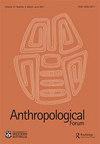差异、固有性和种族阶级趋同
IF 0.7
3区 社会学
Q3 ANTHROPOLOGY
引用次数: 0
摘要
本文分析了差异的政治经济和种族社会基础,特别关注土著人民遭受的反差异暴力以及巴西古拉尼-凯奥瓦人的具体经历。本文通过对黑格尔《精神现象学》的社会科学重新阐释,考察了种族-社会差异和共性。在这本权威的书中,黑格尔提出并逐渐解决了许多关于人类感知的问题,理性的缺点,以及只有通过调解和互动才能发生的理性的渐进进化。因此,每个社会群体的独特特征可以扩展为与其他独特人群共享的种族阶级共性。这与理解将瓜拉尼-凯奥瓦人降低到不确定的无产阶级状态(工人阶级或农民的一般成员)的许多压力特别相关,尽管如此,这还是重振了他们的本土意识。瓜拉尼-凯奥瓦人与工人阶级的其他部分不同,但他们越是看到和被看到不同,他们就越沉浸在其他被剥夺人口的次等性中。将土著人口视为工人阶级和独特种族群体的成员具有重大的政治后果(否定的否定),因为穷人联盟可以挑战政治经济趋势,特别是对农业综合企业农民的非法让步。本文章由计算机程序翻译,如有差异,请以英文原文为准。
Difference, Indigeneity and Ethnoclass Convergence
This paper presents an analysis of the politico-economic and ethnic-social basis of difference, paying special attention to the anti-difference violence suffered by indigenous peoples and the concrete experience of the Gurani-Kaiowa in Brazil. Ethnic-social differences and commonalities are here examined through a social sciences reinterpretation of Hegel’s Phenomenology of Spirit. In this magistral book, Hegel problematises and gradually resolves many questions about human perception, the shortcomings of reason, and the incremental evolution of reason that can only happen through mediation and interaction. The unique features of each social group can consequently expand into ethnoclass commonalities shared with other, unique populations. That is particularly relevant to understand the many pressures to reduce the Guarani-Kaiowa to an indeterminate proletarian condition (generic members of the working class or the peasantry), which has nonetheless revitalised their sense of indigeneity. The Guarani-Kaiowa are different from other segments of the working class, but the more they see, and are seen, as different, the more immersed they become in the subalternity of the rest of the dispossessed population. The identification of the indigenous population as both members of the working class and of unique ethnical groups has major political consequences (the negation of the negation) in terms of poor-poor alliances that can challenge politico-economic trends and, particularly, the illegitimate concessions to agribusiness farmers.
求助全文
通过发布文献求助,成功后即可免费获取论文全文。
去求助
来源期刊

Anthropological Forum
ANTHROPOLOGY-
CiteScore
3.60
自引率
10.00%
发文量
14
期刊介绍:
Anthropological Forum is a journal of social anthropology and comparative sociology that was founded in 1963 and has a distinguished publication history. The journal provides a forum for both established and innovative approaches to anthropological research. A special section devoted to contributions on applied anthropology appears periodically. The editors are especially keen to publish new approaches based on ethnographic and theoretical work in the journal"s established areas of strength: Australian culture and society, Aboriginal Australia, Southeast Asia and the Pacific.
 求助内容:
求助内容: 应助结果提醒方式:
应助结果提醒方式:


